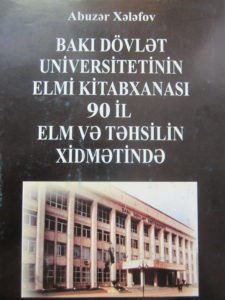
History of Baku’s Manuscript Collection
Associate Professor of Middle East History Nabil Al-Tikriti presented a paper entitled “Some Notes on Manuscript Collections in Azerbaijan“ on Saturday, October 12. The presentation took place on a panel entitled “Sources and Methodological Questions” in Washington, D.C., at the Central Eurasian Studies Society (CESS) Conference.
The paper abstract was: “This past year, while serving a Fulbright grant based at Baku State University (BSU), I was fortunate to explore Azerbaijan’s known manuscript collections. In the course of such explorations, I learned what I could about the history of such collections, their current state of preservation, and their place in regional book culture.
In this paper, I first provide a brief historical summary of Azerbaijan’s manuscript holdings, and an overview of what I understand to be the state of the country’s manuscript collections currently. As is widely known, manuscript collections in Azerbaijan suffered great disruption in the wake of the 19th century Russian imperial conquest, the Great War, and 1930s Soviet anti-religion campaigns. In light of these developments, I provide my views on the region’s early modern and modern manuscript history.
Following this overview, I concentrate on describing the history and current state of the ‘AMEA M. Fuzuli adina El Yazmalar Institutu,’ or ‘Azerbaijan National Academy of Sciences Manuscript Institute named after M. Fuzuli.’ For this portion, I describe the institute’s manuscript holdings, the importance of the most prominent texts, and the practicalities of conducting research at this institution. I also make general observations on the periods which this collection primarily covers, and the broader significance of this collection for national and regional historical research.”
This panel was chaired by Dr. Eren Tasar (University of North Carolina at Chapel Hill). In the same panel, Dr. Khodadad Rezakhani (Princeton University) presented a paper entitled ‘Diplomats on the Steppe: Ibn Fadlan, the Samanids, and the Rise of the Steppe Road’ and Dr. Sherzodhon Mahmudov (Institute of History of the Academy of Sciences of Uzbekistan) presented a paper entitled ‘Russian factors in Khoqand-Istanbul correspondences: analysis of letters of Khoqand rulers kept in Ottoman archives.'”